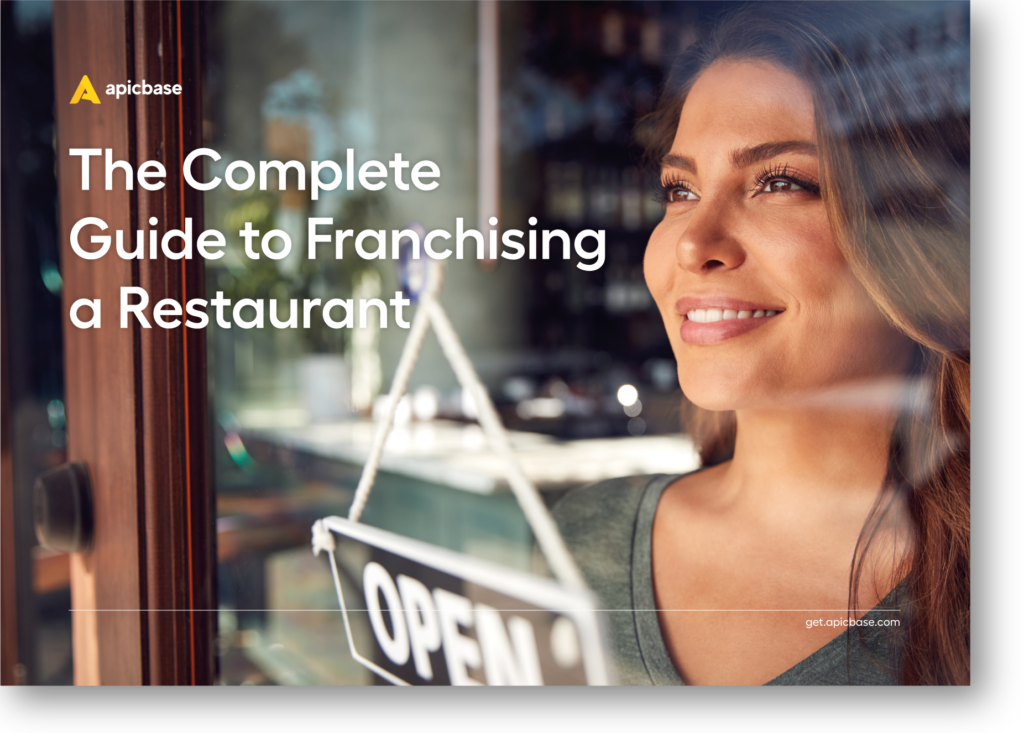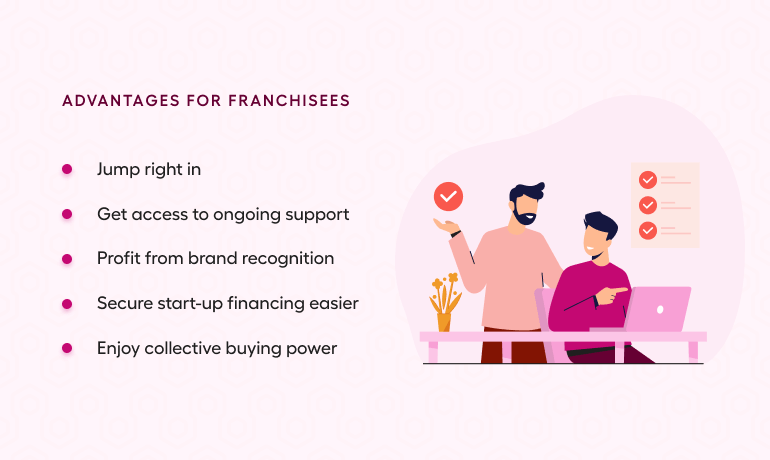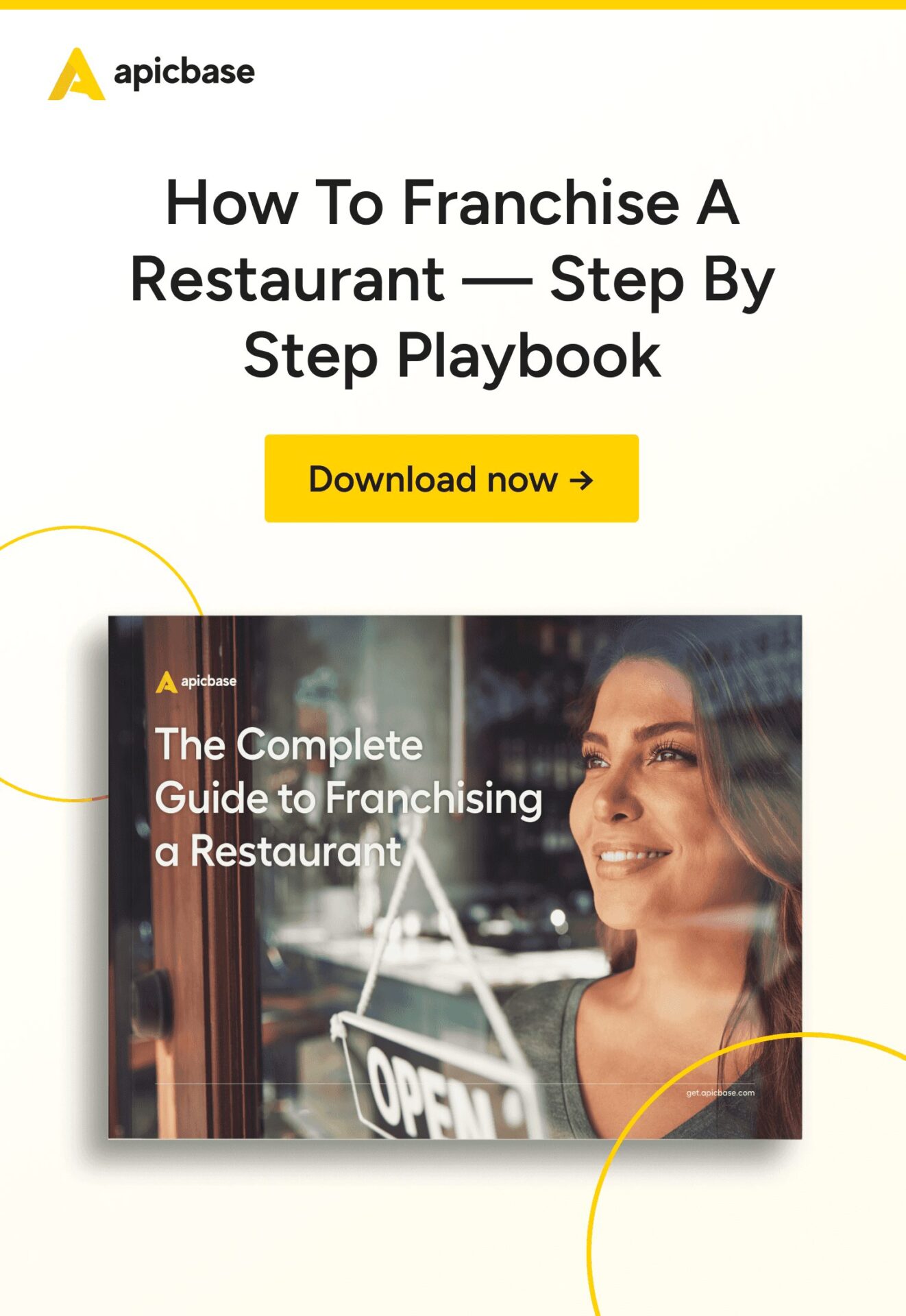Creating a successful and profitable business is every restaurant operator’s goal.
If you run a thriving F&B business, your concept may offer opportunities to expand beyond your current locations.
However, expanding your brand does present a challenge: to succeed, you need to invest plenty of time, resources, and capital.
The latter is the most significant barrier to growth for many restaurant owners. That’s where the franchise expansion model comes into play.
If you’re considering this business model, make sure you fully understand what a franchise restaurant is. You should be in it for the right reasons AND be aware of the potential pitfalls.

How To Franchise A Restaurant?
Develop your franchise using a proven roadmap for franchisors.
👆 Free download
When you franchise your restaurant, you allow an independent investor to buy into your business, selling the license to use your brand name, operations, products, and knowledge.
The independent owner provides the initial investment and signs the restaurant lease agreement and various service contracts. As a result, you can scale your business fast while reducing liabilities.
Restaurant franchising has been around since the 1920s, used mainly by fast-food chains like McDonald’s, KFC, and Taco Bell. But in recent years, it has become popular with all types of multi-unit restaurant businesses.
Today, franchises offer the strong brand awareness and security that budding restaurant entrepreneurs crave.
Also, the explosive increase in unemployment and historically low commercial real estate rental rates have led to a boom in franchising.
For decades now, franchising has been a staple in the foodservice industry of the US. The rest of the world is catching up quickly, though. Namely, Europe is putting the pedal to the metal as these restaurant industry statistics show.
This article explains what a franchise restaurant is and helps you decide whether the expansion strategy is worth considering to grow your restaurant business.
Restaurant Franchise Definition
Before we move on to the advantages, we’ll give you a quick primer on how restaurant franchising works.
What is a franchise restaurant?
A franchise restaurant is a restaurant concept that an independent investor can purchase from the restaurant owner.
The investor doesn’t just purchase the restaurant property in this business arrangement. They buy the right to use the restaurant’s name, trademark, branding, and business model.
The restaurant owner is called the franchisor. The investor operating under the franchise’s brand is called the franchisee.
In exchange for an initial investment and monthly royalty fees, franchisees get access to ongoing support and resources from the franchisor, like:
- operating systems and hardware;
- marketing and sales support;
- real estate expertise;
- recipe database;
- training opportunities;
- supplier contracts and relationships;
- equipment;
- business advice and coaching;
- quality control.
While franchisees run the day-to-day operations of their outlet, they must adhere to the company guidelines, serve the same menu, and use the same branding as all other restaurants within the franchise.
Example of a franchise restaurant
Andy, floor manager of a retail store, has always dreamed of opening a restaurant. But, researching his options, he quickly becomes discouraged.
To set up a restaurant and secure a loan, he’ll have to develop a detailed business plan, a restaurant concept, a name, an enticing menu, and much more.
Having no industry experience, Andy concludes that starting a restaurant will be a risky business venture with no guarantee of success. But then he finds out that Four Gals, a thriving restaurant group, is offering franchise opportunities. In addition, Four Gals provides a complete support package that includes extensive training, marketing and public relations support, advice on pricing, and real-estate know-how.
After talking to the brand’s other franchisees and researching the group’s history and reputation, Andy decides to take the plunge. He puts up a start-up investment and – supported by Four Gals – starts to look for a property. Just three months later, he opens his very own restaurant!
Why Should You Franchise Your Restaurant? 5 Benefits For Franchisors
In our example, we’ve already given away some advantages of franchising for franchisees. We’ll get back to those later. First, we’ll share the benefits of starting a restaurant franchise for you, the franchisor.

#1 You’ll need far less capital to expand your business
Opening a new restaurant requires high capital investment, which is why many brands fail to expand beyond their current locations. But when you operate as a franchise, your franchisee provides the start-up investments. As a result, you can eliminate many typical costs of opening a new restaurant outlet.
#2 You’ll be able to grow your brand fast and efficiently
The franchise system allows you to scale your business much faster than any other method. With your franchisees doing most of the heavy lifting, you can open multiple new outlets in different areas or cities in a short time. Say hello to enhanced brand visibility and reach!
Your network of franchisees can also help you further expand your brand presence through word-of-mouth marketing. As a result, you’ll be able to reach potential customers organically and tap into new markets more easily.
#3 You’ll generate additional income
As long as your franchise agreement lasts, your franchisees will pay you ongoing royalties to legally license your brand, name, and business model. Typically, these fees are between 4% and 10% of the franchise restaurant’s gross revenue.
#4 You’ll be able to allocate your resources better
With your franchisee financially backing the new restaurant and paying royalty fees, you’ll be able to save both time and money. You can put these resources to good use by investing in essential assets that will help set you up for success, like staff training, restaurant tech solutions, and product innovation.
#5 You’ll gain highly-motivated business partners
Franchisees are more committed and loyal to your business than regular employees. As your partner, they’ve invested money into setting up the restaurant, and they’ve signed service contracts with third parties. As a result, they have just as much to lose (and win) as you.
Besides, a franchisee is more likely to stay on board for a long time. If they terminate the agreement before their restaurant becomes profitable, they risk losing their entire investment.
Build your restaurant franchise up from scratch. Get the step by step playbook.
Opportunities Of Running A Franchise: 5 Advantages For Franchisees
Now that you know what franchising can do for your business, we’ll shed some light on the benefits for the potential independent business owners you’ll be working with i.e. the franchisees.

#1 They’ll be able to jump right in
Franchise restaurants draw from your existing – and proven – business model, concept, and recipes. So whether they have experience running a food business or not, entrepreneurs coming into the franchise have everything they need to launch their restaurant right away. That’s why opening a franchise business is much easier than starting one from scratch.
#2 They’ll get access to ongoing support and resources
Support and access to franchisor resources are integral to the franchise agreement.
Your concession owner will have access to your hardware and software systems, recipes, supplier contracts, and equipment. You’ll also provide them with business advice, real estate expertise, marketing support, and training. Finally, your franchisees can expect ongoing support from the other franchisees in the network.
#3 They’ll profit from brand recognition
If you run a thriving restaurant business ready to expand, you have a loyal customer base that is very familiar with your concept and food. That brand recognition will work to the advantage of your franchisees. They’ll have a supply of loyal diners ready to try out your latest restaurant. Attracting new customers in untapped markets should be effortless.
#4 They will find it easier to get start-up funding
Potential business owners that want to become your franchisees have to be prepared to pay a start-up investment of at least a couple hundred thousand euros. Typically, they also need to prove that they have a minimum net worth and liquid assets to cover unexpected costs or expenses.
In addition to purchasing the license to use your brand, trademark, and concept, franchisees need to invest in their restaurant’s decor, kitchen, dining area, equipment, and many other elements.
While it can be challenging to secure a loan for a start-up restaurant, many banks are more lenient on franchises because they have already proven successful.
#5 They’ll enjoy collective buying power
Finally, there’s power in numbers. Concession owners will be able to take advantage of the collective buying power of your franchise to negotiate lower inventory prices, reduced delivery costs, and discounts from suppliers. In some cases, the parent company will even negotiate deals on behalf of its franchisees, allowing them to focus solely on running their restaurant.
What Are The Differences Between Restaurant Chains and Franchises?
One of the most challenging decisions a restaurant owner must make is whether they want to own all their locations directly or allow outside investors to share ownership.
Both expansion strategies have benefits and drawbacks. Here’s an overview that lists each strategy’s pros and cons.
Chain restaurants: benefits and drawbacks
A restaurant chain is corporate-owned, meaning that the parent corporation owns all the locations within the restaurant group. Typically, all branches serve the same menu, although there may be slight regional differences. In addition, all restaurants have the same branding and look and feel.
One of the most significant advantages of running a restaurant chain is that you don’t have to share control with anyone. Instead, you get to make all the decisions that will impact your business: staffing and company structure, menu changes, and marketing and sales strategies.
The other side of the coin is that you’re 100% liable if one or several of your restaurants don’t turn a profit. You need to invest capital, time, and resources to open a new location, taking a substantial financial risk.
Nonetheless, there are many successful chains that don’t offer franchise opportunities and have hundreds of restaurants, like Starbucks, Chipotle, and In-N-Out Burger.
Franchises: advantages and pitfalls
As mentioned earlier, a franchise is a restaurant group where the parent company doesn’t directly own all units. Instead, they sell franchise restaurants to independent owners that can buy into their brand.
Like chain restaurants, franchise outlets serve roughly the same menu, share uniform branding, and have a similar look and feel (diners may not even know if they are sitting in a franchise unit or a chain restaurant).
But unlike chains, franchisors have to share control over restaurant operations with their franchisees, who are stakeholders with their own opinions and ways of running their restaurant. That means you’ll have to run decisions by them and consider their input and feedback at all times. In exchange, your franchisees carry most of the financial risks and liabilities.
Examples of well-known restaurant franchises are McDonald’s, Domino’s, Dunkin Donuts, and Subway.
The Evolution Of The Restaurant Franchise Industry — Trends And Perspectives

A time-tested business model
Earlier, we mentioned that franchising has existed for at least a century. While (quick-service) restaurants may have been the forerunner of this expansion model, franchising today is widely used across industries.
Some of the leading brands in hospitality around the world are franchises, such as Marriott International, InterContinental Hotels Group, and Sheraton. Meanwhile, successful retail franchises include 7-Eleven and UPS Store.
With roughly one out of seven businesses operating as a franchise, it’s clear that franchising has proven its worth.
The numbers don’t lie, either: franchises boast a success rate of around 8% higher than the success rate of independent businesses.
Meanwhile, a whopping 97% of franchise units are profitable.
When you look at the restaurant industry today, franchising is no longer popular with just quick-service restaurants. Other restaurants like (fast) casual dining restaurants, full-service establishments, and sandwich shops have started rolling out a franchise network. Ghost kitchens and virtual brands are impacting the franchising industry, too.
Virtual brand franchises are on the rise

Ghost kitchen franchises are trending because of several reasons. Firstly, ghost kitchens typically leverage innovative technologies to produce highly consistent food quickly. That level of automation makes it easier for franchisees to clone the franchisor’s concept and menu.
Secondly, ghost kitchens are projected to reach a $1 trillion global market by 2030, so they present an incredibly attractive opportunity for independent investors. Finally, opening a ghost kitchen requires a lower investment than a traditional restaurant with a dine-in area.
Virtual brand franchises are another trend: existing restaurants can buy the license to prepare and sell a virtual brand for delivery from their own kitchen. From the virtual brand’s perspective, the restaurants they partner with are called host kitchens.
Entering a host kitchen model partnership is a strategy that has even fewer financial risks for franchisees because the host kitchen already has the necessary infrastructure, staff, and equipment to cook. Additionally, running a virtual brand franchise can help the hosting restaurant operate at maximum capacity while increasing sales.
Launching a virtual brand franchise is also compelling for franchisors because it helps them expand their brand to new markets at low risk.
Ready To Start Building Your Food Franchise Empire? Add Automation To Vital Workflows
To enable smooth day-to-day operations in each of your franchise restaurants, you must invest in restaurant management technology. Selecting the right tech will ensure BOH and FOH efficiency for years to come, but it will also help your business scale faster and more efficiently.
The Apicbase F&B management platform is the backbone of your restaurant franchise.
Our automation solutions allow you to centralise recipes, menus, inventories, vendors, and standard operation procedures, boosting product consistency, cutting food costs, and streamlining logistics.
In addition, Apicbase provides you with valuable insights into your business and data, which will help you make a strong case when attracting investors.

Ensure Consistency Among Franchisees
If you want to ensure consistent menu execution and keep an eye on food costs, sales and inventory levels at your franchise units, get in touch.
Modern F&B technology helps you grow your restaurant franchise while maintaining control of your KPIs.
👆 Schedule a demo



